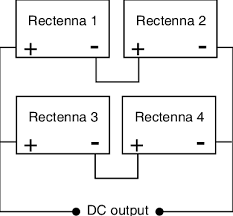The structure and structure of the Rectenna nanosecond communication system based on the nano-microelectronics PhD
Researcher and author: PhD student Afshin Rashid
Note: The combination of optical antennas with the appropriate rectifier system is called Rectenna. It is used in nano-communication and power transmission in the microwave band. It is also used in the production of nano electrical energy.
This compound is introduced to convert the sun's luminous energy into electrical energy and is rapidly developing and researching. While the efficiency of most popular solar cells on the market is at around 30% at best, efficiency of two to three times that of Recten is achievable. It should be noted that Rectena has been used in recent years, especially in the field of power transmission in the microwave band. For example, in theory for single frequency 9.2 GHz, more than 10% efficiency is predicted . However, while the practical efficiency of fabricating these devices may be slightly different, the power of the NTF must be determined in practice.
A linear polarization dipole antenna of 2 / λ with 11% relative bandwidth will be able to collect around 75.2 pW. For these specifications, a dual polarization antenna will yield 5.5 pW. Due to the low power output of each standalone antenna, it is customary to use ant array arrays in this cell, which has its own rules and procedures. The solar antenna must have antenna dimensions at an order of magnitude in the wavelength range to its surface, in order to receive the solar radiation that comprises the infrared, visible and ultraviolet wavelengths, antenna of nanometer dimensions is required. Optical nano-antennas for the collection of solar energy provide a practical solution The high efficiency compared to other technologies such as photovoltaic solar panels is common, leading to the rapid development in Nanotechnology and optical materials industry.
Rectenna nano-flow
When a solar electromagnetic wave hits the nano-antenna surface, a time-varying current is created on the nano-antenna surface, thereby generating voltage at the power supply slot location. Optimal DC power is produced. In the solar rectana system, millions of nano-antennas are assembled together with a suitable rectifier, each individually generating electricity using the sun's light. The antenna is absorbed, carried by a suitable rectifier. The appropriate diodes for this frequency range are 12 MIMs.
Since nano-antennas are capable of wide angular absorption, their efficiency is significantly maintained even when the solar radiation is exposed to the surface of the solar plate . It could also energy emitted from the Earth, the Earth Radiation caused by Tabshh of Daily Sun to the Earth's surface and the length of the hair towers 10 micrometers , the frequency of about 90 THz occur attract the same reason Nano-antennas of the solar rectangle system can also generate electricity by collecting these radiation at night or in bad weather .
Author: Engineer Afshin Rashid
PhD student of Nano-Microelectronics at Islamic Azad University, Science and Research Branch, Tehran





